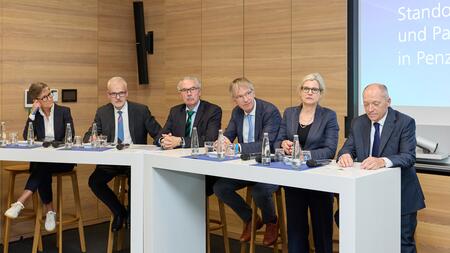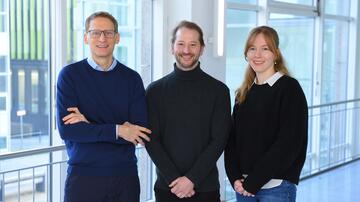Research transfer: Infection research leads to therapeutics
A cutting-edge center for immunology, infection and pandemic research is being built in Penzberg. Significantly involved: DZIF researchers from the Ludwig-Maximilians-Universität München (LMU) and LMU University Hospital Munich
Press conference for the new Fraunhofer Center for Immunology, Infection and Pandemic Research in Penzberg (from left): Dr. Claudia Fleischer (Roche, RDG Head and ITMP Board of Trustees), Prof. Dr. med. Thomas Gudermann (Dean of the Medical Faculty at LMU), Prof. Dr. Markus M. Lerch (Medical Director of LMU University Hospital Munich), Prof. Dr. Hans-Georg Kräusslich (Vice Chair of the Executive Board of the German Center for Infection Research), Prof. Dr. Juliane Winkelmann (Vice President of the Technical University of Munich) and Prof. Dr. Martin M. Hrabě de Angelis (Research Director at Helmholtz Munich).
The coronavirus pandemic provided the decisive impetus: In 2022, a Bavarian branch of the young Fraunhofer Institute for Translational Medicine and Pharmacology (ITMP) was launched in rented laboratory space at the Penzberg Biotechnology Center of the pharmaceutical company Roche. The aim is to identify and characterize pandemic pathogens, develop new diagnostics and therapies and investigate the role of the immune system in infectious diseases in more detail. Construction work is now beginning on the institute's own building in the immediate vicinity of the Penzberg campus. The ITMP site Immunology, Infection and Pandemic Research IIP also has laboratories in Munich-Großhadern, in close proximity to the LMU University Hospital Munich and important life sciences institutes.
For Michael Hoelscher, Professor of Global Health & Infectious Diseases at LMU, Director of the Institute of Infectious Diseases and Tropical Medicine at LMU University Hospital Munich and Coordinator of the "Tuberculosis" Research Area at the German Center for Infection Research (DZIF), this constellation offers the best opportunities for the transfer of results from LMU research and the chance for a "perfect circle of innovation": "The basic techniques are developed in the LMU laboratories, the Fraunhofer specialists turn them into products for diagnostics and therapy in collaboration with industry, which are evaluated and implemented in clinical studies at the LMU Clinical Center."
In this way, the "synthesis of a connection to industry and patient care can be created", which corresponds to the idea of the Fraunhofer Institutes, says Hoelscher, Site Director Penzberg/Munich of the Fraunhofer ITMP. After all, Roche is the largest diagnostics manufacturer in the world and the LMU University Hospital Munich is one of the largest university hospitals in Germany. The Technical University of Munich, Helmholtz Munich and the Bundeswehr Institute of Microbiology are also involved in the cooperation.
Preparedness in the event of a pandemic
Hoelscher uses an example to outline how the cooperation can work and lead to synergetic translational success: the Fraunhofer Institute's task is to find practical technical solutions, in particular diagnostic methods, in order to respond better in pandemic cases or infectiological emergency situations. As a member institution of the DZIF, the LMU University Hospital Munich is now part of the European Vaccine Hub, which aims to develop innovative vaccines, for example against a possible new flu epidemic caused by the H5N1 avian flu pathogen. At the Fraunhofer Institute, the scientists now want to develop corresponding diagnostics in parallel that are tailored to the flu vaccines. "If we do this in cooperation with Roche, we can adapt the development to the company's production platform. In the event of a pandemic, Roche can adopt the diagnostics one-to-one and produce them quickly in large quantities."
Hoelscher speaks of a "perfect match": many of the innovations come from LMU and the LMU University Hospital Munich, and the Tropical Institute at the hospital is "one of the three largest international clinical trial units in Europe. We organize international clinical trials worldwide and have around 45 partners around the world. The studies deal with diseases such as malaria, tuberculosis and HIV and aim to accelerate the development of diagnostics, vaccines and medicines."
Source: Newsroom of the LMU




